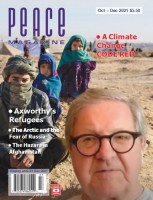
Peace Magazine October-December 2021, page 23. Some rights reserved.
Search for other articles by John Bacher here
For the past year the Milk Tea Alliance has become a symbol of young people in Taiwan, Hong Kong, Myanmar, and Thailand standing up for freedom against mainland China and autocratic regimes allied to it. Apart from the popularity of cold tea outside of Communist China, milk tea is the normal color of the Mekong River, where it has not been subjected to dams, built by both China and autocratic regimes in alliance with it. Protecting the river from ecological degradation by dams has become a rallying cry for the Milk Tea Alliance, combining the struggle for ecology and human rights.
Putting milk into tea in mainland China is disparaged as creeping westernization, vividly shown by the custom of milk tea in Hong Kong, influenced by Great Britain’s colonial rule. While China has clamped down on demonstrations in Hong Kong, the Milk Tea Alliance fosters protests through the internet. These are organized by former residents of Hong Kong who have fled to Taiwan.
While the Milk Tea movement’s activists share a love of tea, this is combined with distinctive humor used to ridicule dictators. The Milk Tea of Hong Kong is allied to Taiwan’s beloved cold beverage, Bubble Tea. Tea jokes are often quite politically pointed. On June 4 a rally in Bangkok was held to commemorate the Tiananmen Square Massacre. Milk Tea activist Netiwit Chotiphataisal gave away 81 Milk Tea cookies at a protest in Bangkok. To mention the massacre is one of the big internet battles with Chinese trolls, who receive high technology assistance from Russia in their vilification of democracy activists.
China’s repression in Hong Kong sparked the exodus of more than 10,800 young Hong Kong democracy activists who have been able to successfully flee to Taiwan (Republic of China). The exiles who forged ties with the allied democracy and environmental movements in Taiwan are linked to eco-struggles throughout east Asia. Among its supporters are the Taiwan Alliance for Thai Democracy, which works closely with the Republic of China’s Green Party.
The Taiwan Alliance for Thai Democracy has had demonstrations with the Milk Tea movement in the country’s capital, Taipei. One of its causes is to open Myanmar’s border with Thailand, which Thai authorities in solidarity with Myanmar’s Chinese—allied dictatorship.
The struggle for democracy in Taiwan was difficult. It began shortly after Taiwan was reunited with the Republic of China in 1945 after the conclusion of the Second World War. It did not succeed until the great democracy wave arose that led to the collapse of the Berlin Wall.
Taiwan’s democracy movement was closely linked to environmental campaigns. One of its iconic symbols is the endangered Taiwanese White Dolphin. It was rescued by protests that led to the cancellation of a naphtha cracker facility that threatened its habitat.
The struggle to save the Mekong River from dams constructed by China and its allies throughout the watershed resonates with the Milk Tea Alliance. The river is full of the charismatic megafauna that the opponents of dictatorship protect. These include the world’s largest fish, the Giant Catfish, the Irrawaddy Dolphin, and the Asian Elephant. So hostile is the government of Thailand to environmental concerns that it has refused pleas by environmentalists to modify dam flows to help fish during critical stages of their life cycles.
A cartoon ridiculing China’s President Xi Jinping was put out on the internet by the Milk Tea movement. It featured Xi in front of a massive dam which permitted only a little trickle of water to flow down the Mekong into Cambodia, Laos, Myanmar, and Vietnam. The alliance put out an on-line petition against Mekong River dams which gathered 100,000 signatures.
The Milk Tea Alliance is a refreshing new form of democratic resistance to the authoritarian waves that have hit Hong Kong and southeast Asia. It also illustrates how the struggles for democracy and the protection of the environment are united.
John Bacher is an environmental activist in St. Catharines, Ontario.

Peace Magazine October-December 2021, page 23. Some rights reserved.
Search for other articles by John Bacher here